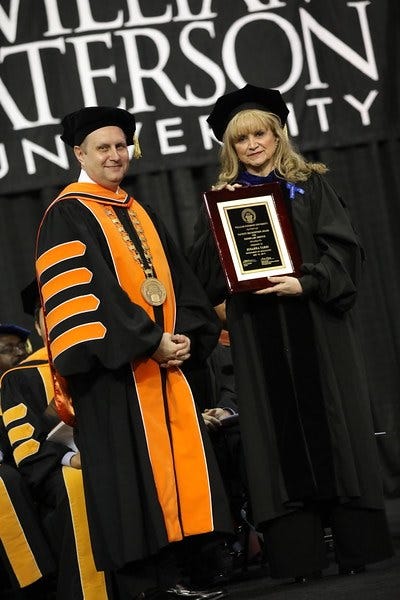The Firings Will Continue until Morale Improves
William Paterson University has lost 109 full-time faculty members in 2 years

109.
109 Professors at every rank from a range of different disciplines. Some were laid off, others agreed to early retirement or separation packages, and some left voluntarily. That doesn’t include additional staff, librarians, or adjunct faculty who have been forced out, and I don’t know precisely how many of those folks were tenured. It must be at least 15-20 people, though, since a dozen were cut with me at the beginning of 2021.
109 is about one-third of the full-time faculty. And it’s HIGHER than the number President Richard Helldobler initially floated as his target for elimination.
When COVID struck, I was concerned that the new administration would use the pandemic as an excuse to restructure the university to their liking. The evidence certainly pointed that way. Helldobler had laid off 180 employees at his previous institution, and he was actively saying that he wanted to reduce the faculty by 100, to “rightsize.”
Since then, he has embarked on a mission to reconfigure undergraduate education according to his own priorities, and he’s extremely confident that his way is the best way. His goal is to prioritize “career-aligned” majors, and he frequently mentions his own status as a first-generation college student, the implication being that he has a special spidey sense about what students want and need.
Here’s another way to put that: his goal is to limit options for students at WPU so that all of their courses are “streamlined" to focus on skills they will need for a career. He is taking away the intellectual challenges that develop critical thinking skills in college—the courses that push students outside of their comfort zones and require them to synthesize what they are learning into a robust worldview. He is eliminating their freedom of choice because he believes he knows what’s best for them. (Reminder: the student population of WPU is about 70% non-white, with a large proportion of non-traditional students.)
So, why isn’t this bigger news? It sounds like it could be a growing problem in NJ public higher ed!
Welp, if you’ve read my newsletter before, you know that the entrenched leadership of the local union is a huge part of the problem. (more here.) You see, Sue Tardi, President of AFT Local 1796 for nearly 20 years, agrees with Helldobler. Or, at the very least, she does not understand what an extreme threat he is, and she just keeps playing along. Prioritizing her “good relationship” with him over the fight to preserve public higher education.
Already in 2021, when the first 13 or so of us were laid off, the Local’s negotiators had made major concessions. They agreed to postpone promotions, and to give up sabbaticals, as well as course release time for research. They made that deal and only brought it to the membership afterwards for a vote. A public vote that was accompanied by an insane amount of pressure including phrases like “if we don’t vote for this, people will lose their jobs.”
At the time, President Tardi was even quoted in Inside Higher Ed, saying:
“We practically gave up everything that makes us academics.”
Her strategy, I can only assume, was to sacrifice the low-hanging fruit in the hopes that the Admin would concede something in return? To give up what appear to be “perks” like promotions and research time, and to martyr a baker’s dozen of people in the bargain? Who knows.
Long story short, it didn’t work. OF COURSE they took everything we offered them and more. They got what they wanted.
The Solidarity Caucus tried to push the leadership of AFT Local 1796 to take a stronger stand. To say NO to any and all layoffs among the full-time faculty. To say that NOT A SINGLE tenured faculty member should lose their job until there were significant administrative cuts. And maybe the Exec Board did say that stuff. In private. All I know for certain is that there was no coordinated effort to organize the membership of the local—to brainstorm strategies, make phone calls, circulate petitions, plan rallies, call a strike vote—to take action. Instead, there were personal attacks, accusations, and an order not to speak to media outlets.
The resulting media silence has been deafening. Misguided attempts to keep the situation under wraps have only emboldened Helldobler, helping him to gain more influence across the State. These days, he is a member of the Executive Board of the New Jersey [University] Presidents’ Council, so he can put a bug in anyone’s ear. If that sounds paranoid, check this out (published in The Jersey Journal ): “Struggling NJCU is pondering hard choices. It can look to William Paterson for some answers.”
Guess what? That’s exactly what New Jersey City University did. As of December 2022, NJCU was planning to cut 37% of academic programs and layoff 30 faculty.
It’s time to stop coddling Richard Helldobler. There’s plenty to reveal about his greed and callousness. For instance, while he was laying people off back in Illinois, he spent college dollars to pay for his trip to the Trump Inauguration. Meanwhile, he was making over $250,000 a year. He also accepted a bonus while laying folks off at WPU, and did some university-funded renovations on the complimentary house he gets with his job.
Like any public figure, Helldobler is vulnerable to pressure. In fact, he really cares about his image, and that makes him VERY vulnerable. The faculty and staff at WPU could still harness their collective power, consider the broader national picture, and take a more definitive stance, with the support of the AFT—both locally and statewide. They could craft a public message to help folks understand how important faculty and staff voices are on a university campus. How student-focused their concerns are. Folks with true institutional knowledge can effectively guide students through their programs, and tenure allows faculty to teach controversial topics without retribution. All of those things matter for the future of higher ed, and the future of American democracy.
For now, though, University Presidents like Helldobler and their Boards of Trustees continue to strategize about money-focused restructuring plans, while the faculty and staff struggle to keep up with more and more students per section. Without the option to apply for a course release or a sabbatical, they’re finding it harder to keep up with the latest developments in their fields, which can make their teaching outdated. Even in fields like medieval art history. (Yes, really). Part of the point of higher ed is to connect the present moment with the histories, systems, and technologies that brought us here! Time to research, write, and think are essential to making those connections, both for students and for professional scholars. Course releases and sabbaticals are not perks. Ultimately, it’s the faculty who know best what nurtures their students, but its pretty tough to function at your peak when you’re traumatized and demoralized. Meanwhile, administrators continue to receive huge taxpayer-funded salaries and benefits packages, finding ways to reward themselves even as their institutions are destroyed.
Recently, Dr. Donna M. Farina, professor of Multicultural Education and a Fulbright Scholar wrote an OpEd in the Jersey Journal called “Tell the whole story of NJCU, please.”
As she says:
I’d appreciate seeing the journal investigate some of the salaries and sweet deals provided recently to administrators who have moved into faculty positions, in the middle of a financial crisis that has caused excellent faculty and staff to receive layoff notices
I’d appreciate that too. Or really any reporting on the increase in administrative positions in the midst of this “crisis.” Or something about the costs of the new childcare center at WPU. Or maybe the amount of money in reserves? Or the money Helldobler has raised in the last few years? Or the importance of small class size? Or the value of public higher education? Really, anything that tells the whole story.
Most of all, I’d appreciate it if the leadership of Local 1796 would finally start allowing their members to organize, and to fight back against the decimation of public colleges in the dear old Garden State.
Princeton will no doubt be fine in the end, but what about the rest of us?





Someone could probably do that, yes, but tbh, I'm focusing on future stuff as much as I can. I was just so enraged when I saw the number that I had to report on it. Also, I should add that folks at WPU are actively been told NOT to publish things like that. The President of the Union said she would write an OpEd two years ago, and nothing.
What a mess, can you submit to the NJ academic journals? Or an op ed to the papers?